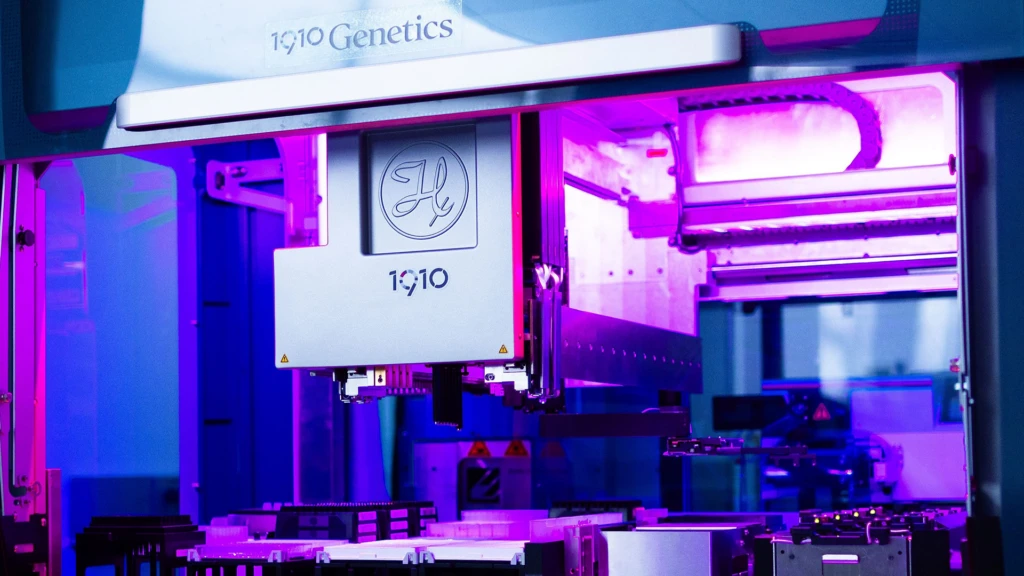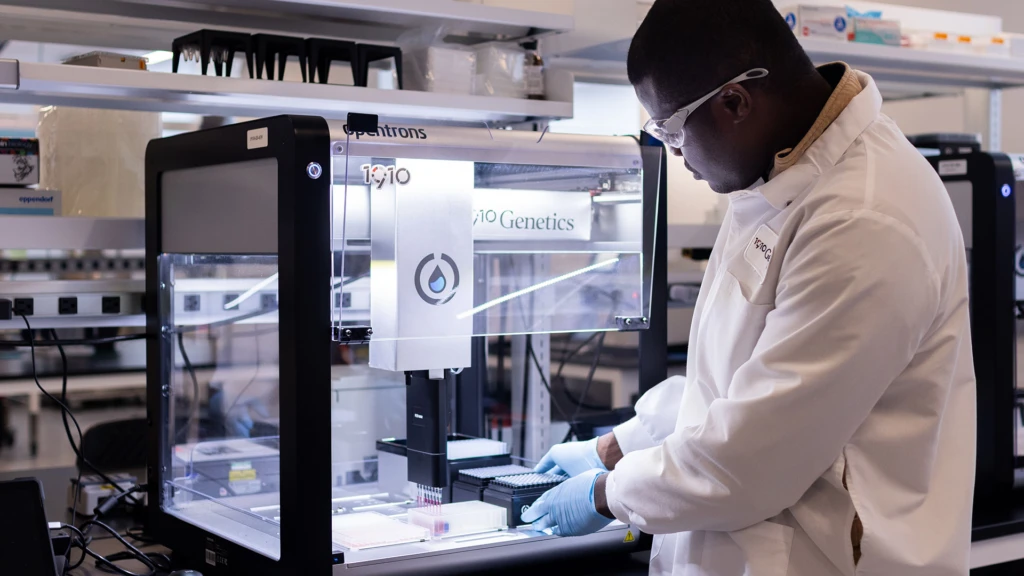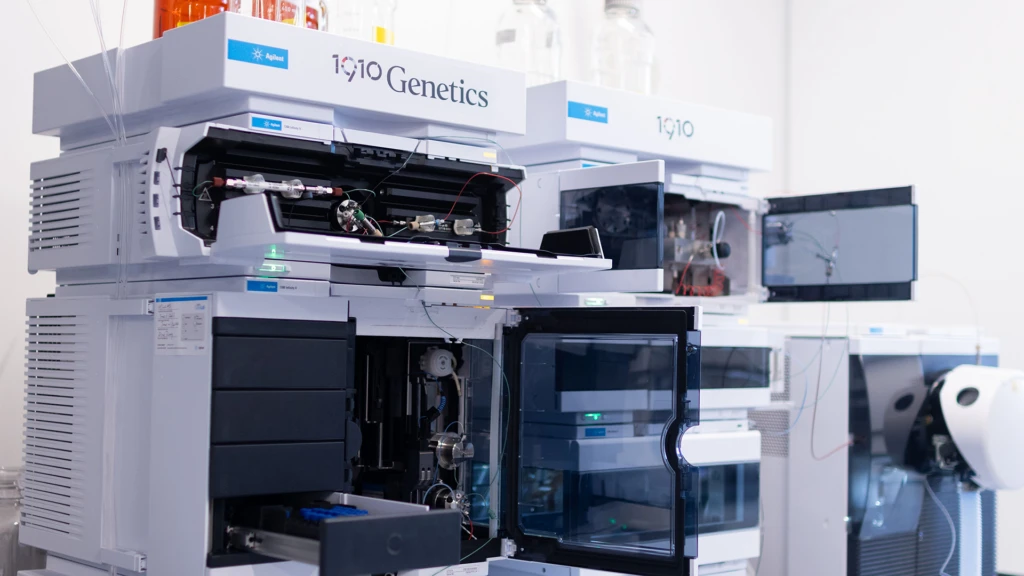Unprecedented collaboration will build the most powerful, fully integrated, AI-driven drug discovery and development platform to dramatically improve pharmaceutical research and development (R&D) productivity and bring novel therapeutics to patients faster and more cost-effectively than traditional approaches.

Microsoft and 1910 Genetics, the only biotechnology company advancing small and large molecule drug discovery with a multimodal AI platform powered by laboratory automation, announced a new five-year commercial agreement and go-to-market collaboration to harness advanced AI and next generation high-performance computing (HPC). This is to reverse 70 years of declining pharmaceutical R&D productivity by combining 1910’s massive computational and wet lab biological data, robotics-driven laboratory automation and multimodal AI models for drug discovery with Microsoft Azure Quantum Elements, a groundbreaking cloud platform purpose built at the intersection of advanced AI and HPC to accelerate scientific discovery. 1910 Genetics will offer the platform to pharmaceutical, biotechnology, government, academic, and research institutions via three partnership models: co-discovery, co-engineering, and Platform-as-a-Service (PaaS).
AI enables a paradigm shift for scientific discovery
Since the 17th century, the scientific method—the fundamental process by which scientists make discoveries—has remained largely unchanged. While this empirical approach has yielded some of mankind’s most remarkable breakthroughs, the scientific method is inherently slow, and human-intensive, requiring iterative cycles of observation, hypothesis, experimentation, and analysis. Today, AI offers an opportunity to compress these cycles and accelerate the time from observation to discovery. This paradigm shift—“AI for Scientific Discovery”, is characterized by the augmentation of human intelligence by AI to rapidly digest centuries of scientific knowledge, identify patterns, make observations, postulate hypotheses, and predict results, all while reducing the need for experimentation. At its most basic level, AI will transform scientific discovery across all industries—from pharmaceuticals to chemicals, sustainable energy, automotive, manufacturing, technology, and more.
Pharma’s declining R&D productivity can be reversed by AI
In the pharmaceutical industry, scientific discovery is fundamentally geared towards the design and development of novel therapies to combat diseases such as cancer, cardiovascular disease, infectious diseases, and neurodegenerative conditions like Alzheimer’s and Parkinson’s disease. However, pharmaceutical R&D is a costly, time-consuming, and failure-prone process. On average, it takes 12–15 years and costs over $2 billion to develop a new drug, with a less than 10% probability that a new molecule entering Phase 1 clinical testing will be successfully approved by the FDA. Since the 1950s, pharmaceutical R&D productivity—defined as the number of new drugs approved by the FDA per billions of dollars invested in R&D—has steadily declined, an observation often revered to as “Eroom’s Law”—which is Moore’s law in reverse.
As humans live longer into old age, we are more likely to become sick, with more diseases to treat. Yet there are not enough therapies currently produced by the pharmaceutical industry to keep pace with aging and disease, given the R&D productivity bottleneck. This bottleneck is caused by a traditional, artisanal and human-intensive approach to drug discovery and development that has remained unchanged for decades—and one for which AI holds tremendous potential to transform.
To realize the promise of AI, the entire drug discovery and development value chain has to be reimagined from the ground up with AI. Critically, an AI-driven drug discovery and development process needs to overcome the pharmaceutical industry’s historically fragmented and disparate data, while creating novel types of data at scale, purpose-built for AI, and with a standardized end-to-end infrastructure that puts massive parallel data, AI, and laboratory automation in the same iterative loop.
1910 Genetics is realizing the promise of AI for science to accelerate R&D productivity
Founded in 2018 and backed by leading investors including M12-Microsoft’s Venture Fund, and Playground Global, 1910 Genetics was built from the ground up as a next-generation, AI-native biotechnology company with three differentiating capabilities:
- To overcome the pharmaceutical industry’s data scarcity problem, 1910 generates three proprietary data streams at massive scale: computational data using atomistic modeling and simulations, wet lab proxy biological data using next generation sequencing, and wet lab ground truth biological data across biochemical, cellular, and in vivo assays.
- To create the massive, wet lab proxy and ground truth biological data for both AI training and molecular testing of synthesized drug candidates, 1910’s state-of-the-art laboratory, powered by robotics and automation, puts massive parallel data, AI, and laboratory automation in the same iterative loop.
- For modality-agnostic drug discovery, the company’s multimodal AI platform can design traditional small molecules, which make up 90% of approved drugs today, as well as large molecule therapeutics.
Since its inception, 1910 has demonstrated that its platform significantly reduces the time and cost of designing novel lead molecules for a variety of therapeutic targets across target classes ranging from proteases, kinases, and transmembrane receptors and for disease areas ranging from neuroscience, infectious diseases, autoimmune diseases, and cancer.

Microsoft Azure Quantum Elements is purpose-built to accelerate scientific discovery
In June 2023, Microsoft launched Azure Quantum Elements, a supercomputer for chemistry that includes advanced AI models, simulation workflows optimized for scaling on Azure HPC clusters, best-in-class AI-accelerated computing, augmented reasoning using AI, integration with quantum tools to facilitate experimentation with existing quantum hardware, and future access to Microsoft’s quantum supercomputer. Azure Quantum Elements contains multiple AI models trained on hundreds of millions of molecules, making it an expert in chemistry and materials science, and it uses generative AI in its “Copilot for Azure Quantum” to write code for computational chemists and material scientists and help them answer tough chemistry questions.
Azure Quantum Elements brings the most powerful AI engine created to facilitate this new AI for Science Wave.
Recently, Microsoft announced that Azure Quantum Elements used advanced AI to screen 32 million candidates in record time to discover and synthesize a new material that can potentially reduce the use of lithium in batteries by 70%, thus, paving the way for the next generation of sustainable batteries. This landmark discovery is a first-of-its-kind in the application of AI for Science to the design of new materials and foreshadows the potential of Azure Quantum Elements in other industries including pharmaceuticals.
1910 Genetics and Microsoft Azure Quantum Elements—a seismic shift in drug discovery
The relationship between 1910 Genetics and Microsoft began in 2021, when M12—Microsoft’s Venture Fund, led the Series A investment in 1910 Genetics. In June 2023, Microsoft announced that 1910 Genetics would be one of six launch customers for Azure Quantum Elements, and the only collaborator in the biotechnology and pharmaceutical industry.
With today’s announcement, Microsoft and 1910 Genetics will expand their pilot collaboration into a five-year commercial agreement and go-to-market collaboration that combines the company’s massive computational and wet lab biological data, robotics-driven laboratory automation, and multimodal AI models for drug discovery with Microsoft Azure Quantum Elements to build the infrastructure layer on which pharmaceutical and R&D teams across the world begin, accelerate and realize their transition to AI-driven drug discovery today and drug development, commercialization, post-marketing surveillance, and real world evidence tomorrow.

“We are thrilled to be collaborating with 1910 Genetics to bring their pioneering AI drug discovery engines to Azure Quantum Elements. This groundbreaking technology holds immense promise for accelerating the design of small and large molecule therapeutics. Our collaboration with 1910 Genetics demonstrates our shared commitment to innovation and our aspiration to solve some of the most challenging problems the world faces in drug discovery. We look forward to what our shared efforts will empower drug researchers to accomplish.”
—Jason Zander, Executive Vice President of Strategic Missions and Technologies at Microsoft.
“We are excited to embark on this collaboration with Microsoft and integrate our small and large molecule drug discovery platform into Azure Quantum Elements. By building the infrastructure layer for AI-driven drug discovery, we will expand the reach and impact of our platform to researchers across the world. We believe that as the biopharma industry prepares for the inevitable transition from human-intensive, rational drug design to AI-enabled discovery with generative AI at the frontier, the winning companies will, like 1910 Genetics, be those who innovate across the entire drug discovery tech stack to use optimized, high-performance computing today and quantum computing tomorrow in concert with high-throughput lab automation to generate large-scale, multimodal data sets. By bringing together 1910 and Azure Quantum Elements, we enable biopharma companies around the world to realize the potential of AI to reverse decades of declining R&D productivity.”
—Jen Nwankwo, Ph.D., 1910 Genetics’ Founder and CEO.
Learn more about 1910 Genetics and Azure Quantum Elements
Customers who are interested in learning more about 1910 Genetics’ small and large molecule drug discovery platform in Azure Quantum Elements can sign up to connect with 1910 Genetics’ and Microsoft.
Register here to be the first to hear from the Azure Quantum team on the latest updates and news.
